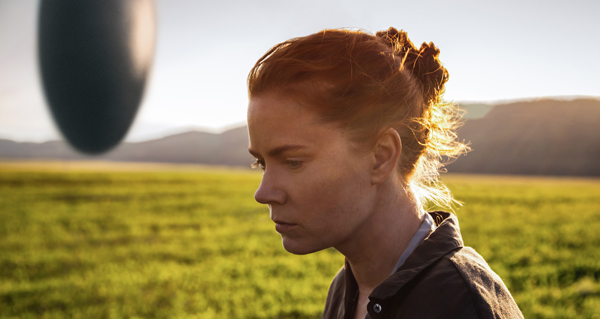
Josh Reviews Arrival
As the film Arrival opens, we are introduced to Dr. Louise Banks (Amy Adams), a linguist living a quiet, solitary life following the death of her daughter. That life is shaken when Earth is visited by extra-terrestrial life, with twelve enormous round objects appearing in different locations around the globe. Dr. Banks is visited by US Army Colonel GT Weber (Forest Whitaker), who tasks her to join a team working to find a way to communicate with the alien life-forms (huge creatures that the human scientists refer to as “heptapods”) within one of the objects/ships. Dr. Banks is paired up with a physicist, Ian Donnelly (Jeremy Renner), and together they work to find some way to translate the mysterious, circular shape-based written language of the alien heptapods so that they can discover why the aliens have come to us.
Arrival is a magnificent film, a gorgeous, original, cerebral sci-fi story. The film has the visual splendor of a big-budget movie, but this is not an action-adventure film, rather this is an intelligent drama that is a fascinating exploration of language and communication. I was enormously impressed by the way the film was able to take these difficult-to visualize concepts and bring them to glorious visual life.
While the film has a very quiet, elegiac tone throughout most of its run time, don’t mistake my calling the film cerebral to mean that it doesn’t have a heartbeat. I was very surprised by how emotionally affecting I found Arrival to be, as the film is as much about the emotional internal life of Dr. Banks (Amy Adams’ character) as it is about the scientific story of language and communication. The developments in the final twenty minutes or so of the film are devastating — heartwarming and heartbreaking in equal measure, an extremely difficult balance to achieve — and I find that I have been continually thinking about this film ever since seeing it.
There are some wonderfully mind-bending aspects to the film’s third act, and this is a film I am eager to see again so I can see how it plays knowing where the story winds up. At first viewing, I was enormously impressed by the careful way in which the story was constructed, with all the different pieces fitting together beautifully in the end. The film was directed by Denis Villeneuve and written by Eric Heisserer, adapting the short story “Story of Your Life” by Ted Chiang. Together, this team has crafted an intricate puzzle of a film that was assembled with great skill and craft.
Amy Adams is magnificent in the lead role. She develops the character of Louise Banks through a lot of small gestures and quiet moments, very slowly peeling back the onion of this solitary woman. She sells all of the film’s big emotional beats and, even more impressively, she’s able to carry the audience with great ease through scenes that contain a lot of exposition, discussing the way language works and the strategies that can be used to learn a language one doesn’t know. These scenes could have been deadly in the hands of a lesser performer, but as executed in the film those moments are wonderful as the movie dives deeply into the scientific and linguistic issues at play.
Jeremy Renner and Forest Whitaker’s characters take a back-seat to Amy Adams’ Louise Banks, but both men bring a lot of life to their supporting roles. I was also pleased to see Michael Stuhlbarg (A Serious Man) pop up as a CIA Agent overseeing the first-contact operation.
The production design of the film is wonderful. I love the look of the alien ships and the alien creatures within. And I was bowled over by the way the filmmakers brought to life the aliens’ bizarre, circular-shaped written language. Every aspect of the film’s design felt impressively original and extremely well thought-out.
I love that Arrival is a movie that unabashedly trumpets the importance of science and intelligence. Even more than that, I love how, in the end, the movie turns out to be about the importance of working together, of communication, of listening to one another and putting aside our differences in pursuit of the greater good. These are the values I like to see in my sci-fi. (I was raised on Star Trek, and I have a great fondness for sci-fi stories that incorporate these values of mutual respect and cooperation.) More than ever in today’s world, I think this is a critically important message.
But while the larger story of Arrival is worthy of praise, the most impactful aspect of the film, for me, was the deeply personal story of Dr. Banks’ experiences that begin when she first sets foot aboard that alien craft. That this film can so successfully combine a large-scale message with such an intimate, small-scale character study is extraordinarily impressive.
I loved this movie. Don’t miss it.
